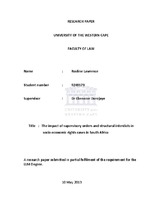| dc.contributor.advisor | Durojaye, Ebenezer | |
| dc.contributor.author | Lawrence, Rosline | |
| dc.contributor.other | NULL | |
| dc.date.accessioned | 2014-03-24T10:17:11Z | |
| dc.date.available | 2013/10/07 | |
| dc.date.available | 2013/10/07 10:46 | |
| dc.date.available | 2014-03-24T10:17:11Z | |
| dc.date.issued | 2013 | |
| dc.identifier.uri | http://hdl.handle.net/11394/3014 | |
| dc.description | Magister Legum - LLM | en_US |
| dc.description.abstract | The sentiment of Justice Ackerman that courts have a particular responsibility and obligation to “forge new tools” and shape innovative remedies to achieve a goal, is profound and based on a constitution with a transformative nature. The injustice of apartheid brought about unequal resource distribution in South Africa and this is well documented. The need for innovative remedies to address these injustices has been in demand. The Constitution of the Republic of South Africa has made available, sufficient remedies for the courts to deal with these concerns. However, the courts need to find a creative way of using and applying these remedies. One such remedy, being promoted by this paper is, structural interdicts with a supervisory jurisdiction. This remedy has a process of meaningful engagement attached to it, to ensure all parties reach practical solutions to ongoing socio-economic rights violations. The ancillary effect of these types of orders will promote future policies to take into consideration socio-economic rights needs of other people in the same position as the applicants. The ongoing supervision of the court will further ensure that government comply with its obligation within reasonable time, and to address ongoing concerns of socio-economic rights violation as and when they arise during the process of engagement. | en_US |
| dc.language.iso | en | en_US |
| dc.publisher | University of the Western Cape | en_US |
| dc.subject | Socio economic rights cases | en_US |
| dc.subject | South Africa | en_US |
| dc.subject | Supervisory orders and structural interdicts | en_US |
| dc.title | The impact of supervisory orders and structural interdicts in socio economic rights cases in South Africa | en_US |
| dc.rights.holder | Copyright: University of the Western Cape | en_US |
| dc.description.country | South Africa | |

